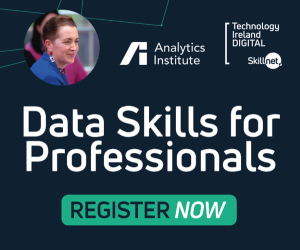Prof Dietrich Rebholz-Schuhmann is Director of the Insight Centre for Data Analytics at NUI Galway. Here he talks to TechCentral.ie about making the switch from medicine to computer science and a future of personalised healthcare.
You made the move from immunology to computer science but decided against a clean break from medicine. Was this by accident or design?
The move was motivated by the uprising of computer science technologies in medicine. I had computer science already on the agenda before I started medicine but preferred to focus on medicine only. The medical studies are great but working as a medical doctor is quite limiting if you want to focus on research.
We hear a lot about ‘unlocking the value of data’. What kind of insights are we seeing from Big Data analysis in life sciences?
It is still common practice to derive new biomedical hypotheses from the observations of individual patients in the clinical domain. Big Data gives the opportunity to consolidate early on such hypotheses against existing data, for example from patient records or from public databases on biological experiments. As a result we can focus our biomedical research to a degree, which improves the research outcomes and helps to choose the most challenging hypothesis – supported by existing data – before entering into the execution phase of a research project, like a clinical trial.
What kind of projects are being worked on at Insight?
Insight focuses on different types of data, for example text data, fact repositories, image data, and on a wide scale of technologies ranging from algorithmic analysis to natural language processing, image analysis, complex machine learning approaches, optimisation techniques and artificial intelligence.
Our ‘applications’ are IT solutions for experts that give recommendations on large-scale data, provide decision support, and in the best case can identify important relationships in existing data, like which drug performs best in a specific set of patients. Often our complex IT solutions can be embedded into different applications depending on the user group: a domain expert requires different settings from a lay person.
When you are dealing with data from many sources that weren’t intended to be put together, how do you go about imposing a single standard on the material you want to study?
The single standard is often defined by the goals that we want to achieve. In a statistical method, it is necessary to understand what the numerical data is describing. In structured semantics data it is important to understand how the information relates to the real world, i.e. which type of abstraction or normalisation has been used to provide the data.
Where do you see data analytics expanding to in life sciences next?
The Life Science domain is based on scientific experiments and the data that has been delivered from these experiments. In the current stage, we have access to a wide range of genomics data and it is our ambition and focus of our efforts to read as much information about one or many organisms from this data.
It is only a matter of time, until enough models and experimental data is available to fully interpret biomedical research based on the genomics information and the experimental setting leading into personalised and precision medicine.
It is certainly foreseeable that humans could be monitored on a 24/7 basis to capture early deterioration of their disease states while staying in our normal life, in contrast to entering into a clinical domain. People will get used to receiving individualised feedback on improving their health conditions, like whether they are on track of gaining of losing weight.








Subscribers 0
Fans 0
Followers 0
Followers